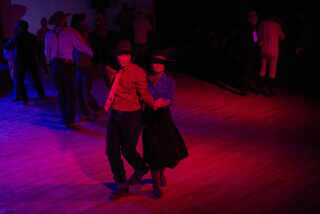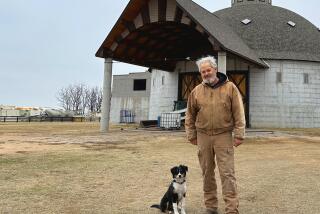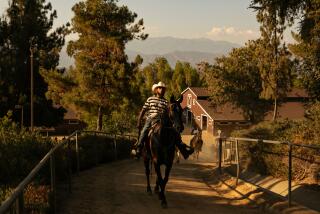Johny Carpenter, 88; Actor Taught Disabled Children to Ride at Ranch
- Share via
Johny Carpenter, a B-western actor and writer-producer who gained greater fame off-screen for his work with the disabled, has died. He was 88.
Carpenter, whose Old West-style Heaven on Earth Ranch hosted thousands of disabled children over the decades and earned him national recognition, died of cancer Feb. 27 in a Burbank nursing home.
His greatest on-screen claims to fame were four low-budget westerns that he starred in, wrote and produced in the 1950s: “I Killed Wild Bill Hickok,” “Outlaw Treasure,” “Lawless Rider” and “Son of the Renegade.”
“He was the last guy to independently turn these little B-western pictures out,” said Boyd Magers, editor-publisher of Western Clippings, a western-film publication, and a friend of Carpenter’s.
“He was right at the tail end of it,” Magers said. “Had he come along a little earlier and been with a decent studio, he could have been a lot bigger.”
But Carpenter’s western films, Magers said, “became secondary to what he contributed to this world.”
In the mid-1940s, when Carpenter had a small ranch near Griffith Park, he was approached by a group of blind musicians who wanted to ride horses.
“I told them I didn’t know how a blind person could be taught to ride,” Carpenter told The Times in 1995.
“But they were persistent and I finally put them on four old, slow horses and walked around the corral with them. They loved it.”
The men, who became regulars at Carpenter’s ranch, eventually were able to ride jumping horses. And as word spread, Carpenter recalled, “I had more blind and disabled people wanting to ride, so I just taught them.”
In 1969, he leased 4 1/2 acres in Lake View Terrace, which he dubbed the Heaven on Earth Ranch.
With help from volunteers, including off-duty police officers from the Foothill Division and firefighters, he built a replica of an Old West town, complete with a saloon, general store and jail.
Over the years, thousands of children from the Los Angeles Unified School District and groups such as the United Cerebral Palsy/Spastic Children’s Foundation, visited the ranch for free.
They would spend the day touring the western town, riding horses, going on hayrides, riding in a stagecoach and dining on barbecued hamburgers. Carpenter also would join volunteer stuntmen in performing for his visitors.
“The ranch is many things to the handicapped,” a Westside mother of two sons told The Times in 1970.
“For one thing,” she said, “it is a stimulus for the senses. These kids need it more than other children. Carlos [her son] began to talk, something he couldn’t or wouldn’t do before, after he was here only three months.”
Carpenter knew what it was like to battle physical hardships.
Born Jasper Carpenter in 1914 in the tiny Ozark mountain town of Debinsville, Ark., Carpenter learned to ride horseback on his father’s farm. But baseball became his passion.
As a member of the University of Arkansas varsity team at 18, he moved up to the Southern League and was set to join the Chicago White Sox in 1936.
But during spring practice, he was seriously injured in a hit-and-run accident: He broke his left leg in seven places, broke his back and had internal injuries. He spent 119 days in a body cast and his chance at a baseball career ended.
By the early ‘40s, Carpenter and his brother, Frank, were living in Los Angeles. Johny Carpenter found work in a stable and his riding skills soon attracted interest from film studios.
As a stuntman, Carpenter rode a horse in the Grand National race in “National Velvet,” the 1944 film starring Mickey Rooney and Elizabeth Taylor.
Around the same time, he began doing bit parts in low-budget westerns such as “Navajo Trail” starring Johnny Mack Brown and “The El Paso Kid” starring Sunset Carson, then worked his way up to larger roles in B-westerns such as “Badman’s Gold.”
Carpenter told The Times years ago that he supported the Heaven on Earth Ranch with his savings, occasional work such as shoeing horses and from donations from individuals and civic organizations.
In 1993, the owner of the ranch property evicted Carpenter in hopes of selling or subdividing the land.
Carpenter reestablished his Heaven on Earth Ranch at several locations for brief periods. The last one, near Hansen Dam, closed around 1996 because the owner raised the rent and Carpenter didn’t have the money to pay it, friends said.
“He had a very big heart,” said Lee Diebold, a stuntman who first met Carpenter in 1947. “He touched a lot of people.”
Over the years, Carpenter received awards (including the Jefferson Award from the American Institute of Public Service) and letters of commendation from then-California Gov. Ronald Reagan, Pat Nixon, Los Angeles Mayor Sam Yorty and other notables.
“The Bible says, ‘As you sow, so shall ye reap.’ Well, I’ve reaped two-hundredfold,” Carpenter told Reader’s Digest in 1982.
“I’ve gotten more satisfaction out of this ranch than anything else I’ve ever done. Everything I own is on my back.
“Yet because of the ranch, I can get up every morning and walk down the street like a king. If I get to heaven, it’ll be on the coattails of these kids.”
Carpenter is survived by a sister, Corinne Bostian, of New Mexico.
More to Read
Only good movies
Get the Indie Focus newsletter, Mark Olsen's weekly guide to the world of cinema.
You may occasionally receive promotional content from the Los Angeles Times.










